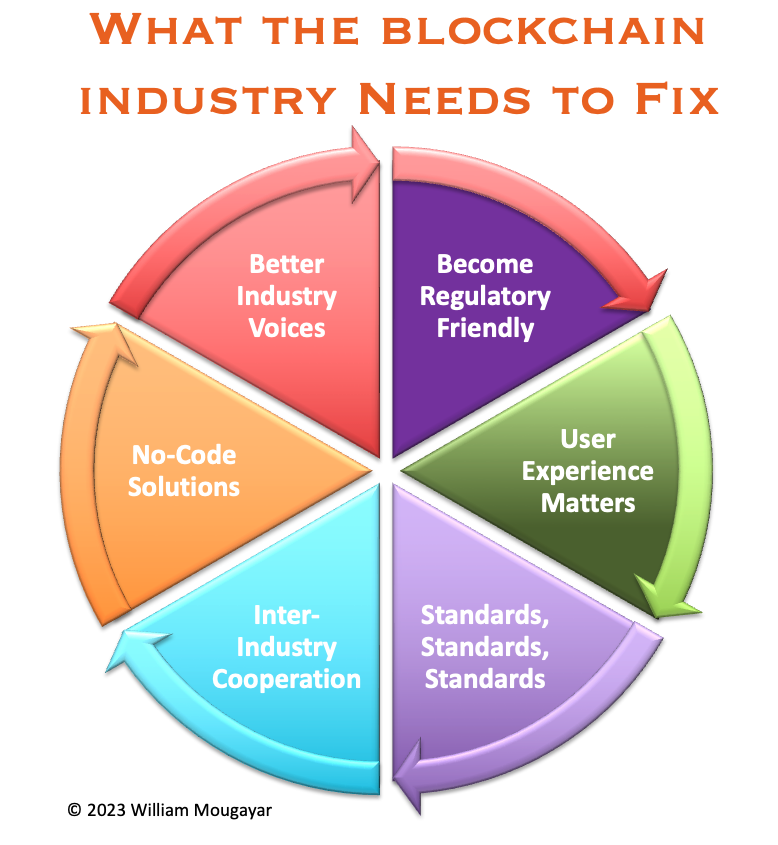No, I’m not going to write about what the naysayers are already saying about the blockchain. We have heard these objections ad nauseam: tokens are made out of thin air, it doesn’t do anything we can’t do already, no use cases, every token is a scam or Ponzi scheme, cryptocurrencies are not real currencies, crypto can’t become too big to fail, etc.
Rather, I’m writing about a constructive critique in terms of weaknesses that need to be addressed if we want to see the blockchain/crypto industry prosper to greater heights. That’s why the title specifically says “IN” the blockchain industry, not “WITH” the blockchain industry.
Here are the issues that need to be fixed, in my opinion.
Rather, I’m writing about a constructive critique in terms of weaknesses that need to be addressed if we want to see the blockchain/crypto industry prosper to greater heights. That’s why the title specifically says “IN” the blockchain industry, not “WITH” the blockchain industry.
Here are the issues that need to be fixed, in my opinion.

1/ Become Regulation Friendly
I’m not saying the industry needs to blindly surrender to established de-facto regulation. The regulatory field is complex and nuanced. Whatever the end-game is, crypto needs to be compliant with it, and then prosper within those rules. Regulation shouldn’t be suffocating innovation. So, that doesn’t mean that the industry needs to stop lobbying for, and educating legislators about the right way to evolve some parts of the current rules or create new ones. Ideally, we need to see updated regulation that is more friendly to crypto.
2/ User Experience Matters
No technology has gained mainstream experience without espousing absolute simplicity and ease of use. Today, many products and services (including wallets) in the blockchain space have horrible user interfaces and user experiences. As if they were not designed with the mainstream consumer in mind. This needs to change. I am longing to see crypto products that generate a “Wow” effect from a user experience point of view.
3/ Standards, Standards, Standards
There are two types of standards: de facto or industry ones. De facto standards just happen because of adoption success. Industry standards are developed by competing industry players that agree on common ground principles that are neutral to their competitiveness. Sadly, I do not see enough de facto standards emerging in the blockchain space (especially across chains), and I see no cross-industry initiatives at the technical level. That brings us to the next topic.
4/ Inter-Industry Cooperation
Related to the point above on standards, the industry needs to collaborate more on important infrastructure or middleware related technologies because these are the enabling blocks for creating the ultimate applications that users will be attracted to. As it stands, there is too much competition, and not enough co-operation. In the non-technical realm, yes, there are some “blockchain associations” counting several industry members, but I firmly believe we can do better and more in this area in terms of effectiveness and results.
5/ No-Code Solutions
The reason we now have 5 billion Internet users is because it’s so easy to get in and start using it via the many on-ramps such the ones provided by social media, email applications or e-commerce. Behind the scenes, what also made this possible is the wide availability of “no-code solutions” that allow anyone via a few clicks and some common sense to create something worth attracting users to. For e.g., in the area of publishing, Wordpress or Tumblr (previously) lowered the bar for creating a personal website by enabling anyone to do that without the help of a developer. Shopify allows anyone to start selling their products online, just like that, with a few clicks. We will need similar types of no-code solutions that allow anyone to create new experiences that depend on the blockchain.
6/ Better Industry Voices
Last year, the mainstream media was too heavily focused on painting Sam Bankman-Fried as the perfect poster boy of crypto. Today, we know where that story led, and we are still overhung by that unfortunate head fake from the previously (arguably) most popular crypto cheerleader. Industries need cheerleaders to advance, just as for example Elon Musk was that special charismatic voice for the Electric Vehicles industry. There are lots of good and smart people in crypto, but we need more of their voices to be heard, and we need the mainstream media platforms to find them, respect them and amplify their voices while they give less airtime to the promoters, speculators and wannabes.
These are all strategic issues that will take time to get fixed. But we need to work on them.
I’m not saying the industry needs to blindly surrender to established de-facto regulation. The regulatory field is complex and nuanced. Whatever the end-game is, crypto needs to be compliant with it, and then prosper within those rules. Regulation shouldn’t be suffocating innovation. So, that doesn’t mean that the industry needs to stop lobbying for, and educating legislators about the right way to evolve some parts of the current rules or create new ones. Ideally, we need to see updated regulation that is more friendly to crypto.
2/ User Experience Matters
No technology has gained mainstream experience without espousing absolute simplicity and ease of use. Today, many products and services (including wallets) in the blockchain space have horrible user interfaces and user experiences. As if they were not designed with the mainstream consumer in mind. This needs to change. I am longing to see crypto products that generate a “Wow” effect from a user experience point of view.
3/ Standards, Standards, Standards
There are two types of standards: de facto or industry ones. De facto standards just happen because of adoption success. Industry standards are developed by competing industry players that agree on common ground principles that are neutral to their competitiveness. Sadly, I do not see enough de facto standards emerging in the blockchain space (especially across chains), and I see no cross-industry initiatives at the technical level. That brings us to the next topic.
4/ Inter-Industry Cooperation
Related to the point above on standards, the industry needs to collaborate more on important infrastructure or middleware related technologies because these are the enabling blocks for creating the ultimate applications that users will be attracted to. As it stands, there is too much competition, and not enough co-operation. In the non-technical realm, yes, there are some “blockchain associations” counting several industry members, but I firmly believe we can do better and more in this area in terms of effectiveness and results.
5/ No-Code Solutions
The reason we now have 5 billion Internet users is because it’s so easy to get in and start using it via the many on-ramps such the ones provided by social media, email applications or e-commerce. Behind the scenes, what also made this possible is the wide availability of “no-code solutions” that allow anyone via a few clicks and some common sense to create something worth attracting users to. For e.g., in the area of publishing, Wordpress or Tumblr (previously) lowered the bar for creating a personal website by enabling anyone to do that without the help of a developer. Shopify allows anyone to start selling their products online, just like that, with a few clicks. We will need similar types of no-code solutions that allow anyone to create new experiences that depend on the blockchain.
6/ Better Industry Voices
Last year, the mainstream media was too heavily focused on painting Sam Bankman-Fried as the perfect poster boy of crypto. Today, we know where that story led, and we are still overhung by that unfortunate head fake from the previously (arguably) most popular crypto cheerleader. Industries need cheerleaders to advance, just as for example Elon Musk was that special charismatic voice for the Electric Vehicles industry. There are lots of good and smart people in crypto, but we need more of their voices to be heard, and we need the mainstream media platforms to find them, respect them and amplify their voices while they give less airtime to the promoters, speculators and wannabes.
These are all strategic issues that will take time to get fixed. But we need to work on them.
About William Mougayar
William wrote the preface to Laurent Leloup's book: Blockchain, la révolution de la confiance.
William Mougayar is a Toronto-based blockchain investor, researcher, blogger, and best-selling author of The Business Blockchain (Wiley, 2016, translated in 10 languages). He is a direct participant in the crypto-technology market, working alongside startups, entrepreneurs, pioneers, innovators, creators, enterprise executives and practitioners. He has been described as the most sophisticated blockchain business thinker.
William is currently the Executive Chairman for the Kin Foundation, and a Board Member at Blockchain Valley Ventures (Switzerland). William is also the founder/producer of The Token Summit, and manages WMX, an ICONOMI cryptocurrency index. He also created OnCoins.org.
Some of William's early investments include Dapper Labs (creators of CryptoKitties), Blockstack, Ethereum, Filecoin, Kin, OpenBazaar and Roll.
He was formerly a Special Advisor to the Ethereum Foundation, Board Member at Stratumn (France) and an advisory board member for OMERS Ventures (Canada), and Coin Center. Previously, he held senior positions at Hewlett-Packard, Cognizant and AberdeenGroup, and has founded 3 tech startups.
William is a graduate of the University of Washington, the University of Western Ontario Ivey School of Business, and attended the University of British Columbia Graduate Commerce School.
https://www.wmougayar.com/
William wrote the preface to Laurent Leloup's book: Blockchain, la révolution de la confiance.
William Mougayar is a Toronto-based blockchain investor, researcher, blogger, and best-selling author of The Business Blockchain (Wiley, 2016, translated in 10 languages). He is a direct participant in the crypto-technology market, working alongside startups, entrepreneurs, pioneers, innovators, creators, enterprise executives and practitioners. He has been described as the most sophisticated blockchain business thinker.
William is currently the Executive Chairman for the Kin Foundation, and a Board Member at Blockchain Valley Ventures (Switzerland). William is also the founder/producer of The Token Summit, and manages WMX, an ICONOMI cryptocurrency index. He also created OnCoins.org.
Some of William's early investments include Dapper Labs (creators of CryptoKitties), Blockstack, Ethereum, Filecoin, Kin, OpenBazaar and Roll.
He was formerly a Special Advisor to the Ethereum Foundation, Board Member at Stratumn (France) and an advisory board member for OMERS Ventures (Canada), and Coin Center. Previously, he held senior positions at Hewlett-Packard, Cognizant and AberdeenGroup, and has founded 3 tech startups.
William is a graduate of the University of Washington, the University of Western Ontario Ivey School of Business, and attended the University of British Columbia Graduate Commerce School.
https://www.wmougayar.com/
Autres articles
-
Revolut obtient une licence bancaire au Royaume-Uni
-
Nominations | Eight Advisory annonce deux nouveaux associés en France
-
NFT : L'Opéra de Paris dévoilera à la rentrée une nouvelle collection d'art numérique
-
Ferrari étend son système de paiement en crypto-monnaie à l'Europe après son lancement aux États-Unis
-
WEB3 : L'Europe, le baby-blues des licornes ?

















